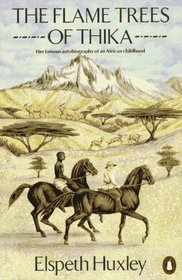The Flame Trees of Thika is
Elspeth Huxley's reminiscences of her childhood in British East Africa (what is now Kenya) from 1912 to 1914. She was only six years old in 1912 and must have been a very precocious child with a good memory to be able to write this narrative almost 50 years later. She tells the story of how her parents, Robin and Tilly, moved to Africa to start a coffee plantation on 500 acres between the banks of two rivers near Thika. Her father, Robin, bought the land sight unseen with the faith-based knowledge that the soil was ideal for coffee growing and the expectations of making a fortune a few years down the line. But first, the land had to be cleared and planted during the rainy season. The native people, the
Kikuyu, had to be persuaded to help in this task and most of them were very reluctant to do so. But eventually, the land was cleared and a crop planted. Huxley tells the story of living on the land and observing and delving into the culture of the native people and the beauties and hazards of the landscape. These hazards included wild animals and insects including ticks which Elspeth learned to pluck off of her and squash them in her fingers. "There were also jiggas. These burrowed under your toenails, laid their eggs, and created a swollen, red, tormenting place on your toe." And then there were the
siafu or driver ants that could attack and eat animals to the bone.
But Elspeth learned to enjoy her home in Africa and had a couple of chameleons as pets. She also had a young
duiker, a small antelope, that she kept as a pet. It often got into the family's garden and its exploits reminded me a lot of the novel
The Yearling. Eventually, the duiker ran off to be in the wild but when it did, Elspeth thought it may have been eaten by the python that lived in a pool in the river. The python was swollen after eating some kind of larger animal but it turned out that after it had been killed, it had swallowed a young goat. She also tells of her white neighbors and their relationships that were probably hard to understand for a six-year old. There were also the eccentricities of some of the neighbors, such as having a velvet upholstered couch and a grand piano in a dirt floored cabin. But mainly this narrative was about living in the wildness of Africa with Mount Kenya in the distance.
At the outbreak of WWI, Robin joined the armed forces to fight against the Germans and Elspeth and Tilly returned to England. Elspeth and Tilly did go back to Africa after the war as related in her book,
The Mottled Lizard.
I enjoyed this look at the early days of life in Kenya. It was an interesting narrative of a time and place now long gone. There were some disparaging comments made by some of the whites against the native Kikuyu who often viewed them as lazy savages. The "n word" was also used a few times in these descriptions but I think Huxley did this to show the narrow-mindedness of the settlers at the time. Overall, I would recommend this to anyone interested in European involvement in turn of the century Africa.





